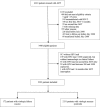The vulnerability of men to virologic failure during antiretroviral therapy in a public routine clinic in Burkina Faso
- PMID: 24433983
- PMCID: PMC3895258
- DOI: 10.7448/IAS.17.1.18646
The vulnerability of men to virologic failure during antiretroviral therapy in a public routine clinic in Burkina Faso
Abstract
Introduction: Gender differences in antiretroviral therapy (ART) outcomes are critical in sub-Saharan Africa. We assessed the association between gender and virologic failure among adult patients treated in a public routine clinic (one of the largest in West Africa) in Burkina Faso.
Methods: We performed a case-control study between July and October 2012 among patients who had received ART at the Bobo Dioulasso Day Care Unit. Patients were eligible if they were 15 years or older, positive for HIV-1 or HIV-1+2, and on first-line ART for at least six months. Cases were all patients with two consecutive HIV loads >1000 copies/mL (Biocentric Generic or Abbott Real Time assays), or one HIV load >1000 copies/mL associated with immunologic or clinical failure criteria. Controls were all patients who only had HIV loads <300 copies/mL. The association between gender and virologic failure was assessed using a multivariate logistic regression, adjusted on age, level of education, baseline CD4+ T cell count, first and current antiretroviral regimens and time on ART.
Results: Of 2303 patients (74.2% women; median age: 40 years; median time on ART: 34 months), 172 had virologic failure and 2131 had virologic success. Among the former, 130 (75.6%) had confirmed virologic failure, 38 (22.1%) had viro-immunologic failure, and four (2.3%) had viro-clinical failure. The proportion of men was significantly higher among the cases than among the controls (37.2% vs. 24.9%; p<0.001). Compared to controls, cases were also younger, more immunodeficient at ART initiation, less likely to receive a protease inhibitor-based antiretroviral regimen and had spent a longer period of time on ART. After adjustment, male gender remained strongly associated with virologic failure (odds ratio 2.52, 95% CI: 1.77-3.60; p<0.001).
Conclusions: Men on ART appeared more vulnerable to virologic failure than women. Additional studies are needed to confirm the poorer prognosis of men in this setting and to determine the causes for their vulnerability in order to optimize HIV care. From now on, efforts should be made to support the adherence of men to ART in the African setting.
Keywords: Africa; HIV; antiretroviral; efficacy; gender; virologic failure.
Figures
References
-
- WHO, UNICEF, UNAIDS. Global update on HIV treatment 2013: results, impact and opportunities. 2013. [cited 2013 Aug 19]. Available from: http://apps.who.int/iris/bitstream/10665/85326/1/9789241505734_eng.pdf.
-
- Braitstein P, Boulle A, Nash D, Brinkhof MW, Dabis F, Laurent C, et al. Gender and the use of antiretroviral treatment in resource-constrained settings: findings from a multicenter collaboration. J Womens Health. 2008;17(1):47–55. - PubMed
-
- Laurent C. Commentary: HIV testing in low- and middle-income countries: an urgent need for scaling up. J Public Health Policy. 2013;34(1):17–21. - PubMed
Publication types
MeSH terms
Substances
LinkOut - more resources
Full Text Sources
Other Literature Sources
Medical
Research Materials


